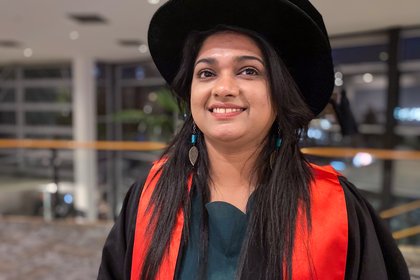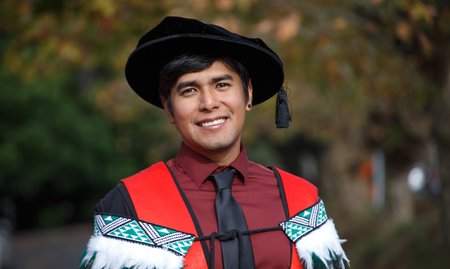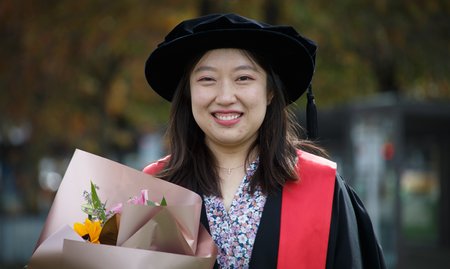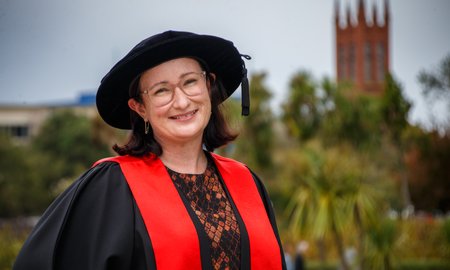
Dr Indu Sudarsan.
“Understanding asthma management in an Indian immigrant context may help healthcare practitioners better serve this population, leading to improved health outcomes,” Dr Sudarsan says.
Her study provided a comprehensive picture of Indian immigrant children’s asthma journeys, highlighting the significance of providing culturally-safe healthcare.
Dr Sudarsan was surprised by the intensity of stigma surrounding childhood asthma in the Indian community, which ultimately influenced children’s health behaviours, health-seeking behaviour and ultimately their health outcomes.
“Some parents feared that disclosing the diagnosis might affect their child’s marriage and future job prospects. Children with inhalers received negative views from society and were underestimated for their skills in physical and sporting activities.”
Such stigma led some family carers to advise children not to disclose the condition, even to close family members, and preferred not to inform school staff about their child’s asthma, she adds.
Despite being from India herself, Dr Sudarsan says she was not aware of the intensity of the stigma around asthma among the Indian community.
She hopes her research can serve as a foundation for further research and the development of new strategies and policies to support the health of this population.
“These efforts might include the integration of traditional Indian healing practices into the asthma care plans of these children, as well as the provision of culturally appropriate education and resources to reduce asthma-related health disparities.”
Dr Sudarsan completed her master’s degree in nursing in 2013 and migrated to New Zealand in 2015, beginning her PhD with Massey in 2019. She was based at the Pukeahu campus in Wellington and was supported through her studies by a three-year doctoral scholarship.
She says by embarking on her PhD journey she wanted to show others that the nursing training she had in India could be expanded on.
“Although Indian immigrants account for a significant portion of the nursing workforce, few choose to pursue higher education such as a doctorate. I have observed that many are unable to pursue higher education due to the challenges they face such as preoccupation with providing for their families and working long hours to make ends meet.
“I wish to serve as a positive role model for Indian postgraduate immigrant nurses to remain motivated and achieve their highest academic goals. I want to use my voice and experience to inspire this group of nurses to succeed in their academic and professional pursuits.”
Since January, Dr Sudarsan has been working as a Senior Tutor in the School of Nursing, as well as working on a casual basis as an aged care nurse. She says she was inspired by her mother, who worked as a high school principal.
“My mother’s dedication to education has been a major influence on my personal and professional development and has inspired me to pursue a career in nursing education. I also believe the best way to teach nursing is to lead by example and I am dedicated to inspiring and empowering the next generation of nurses.”
She has also dedicated her doctorate to her father, who sadly passed away last year. It was his dream to see his daughter graduate.
Dr Sudarsan and husband Vipin have three children aged eight, four and two. She says they provided her with unconditional love, understanding and emotional support throughout her studies.
“They often sacrificed their own needs and desires to accommodate my rigorous study and research schedule. They were understanding of the long hours I had to put in and never complained. They were my biggest cheerleaders and always encouraged me to keep going.”
She also expresses her gratitude to supervisors Professor Nicolette Sheridan, Professor Karen Hoare and Dr Jennifer Roberts for their guidance and encouragement.
Interested in studying nursing?
Related news
Saving endangered bird species a passion for PhD graduate
For his doctoral research, Dr Enzo Reyes investigated the factors that need to be considered to successfully translocate the endangered Floreana mockingbird to Floreana Island in the Galápagos Archipelago.

Research delves into heat stress response in athletic females
The way the female body responds to exercise-heat stress, especially when considering ovarian hormone profiles, is an area of research that Dr Lizzie Zheng found to be lacking.

Belonging and gender equity in Aotearoa New Zealand community football organisations
After working in football marketing and communications roles for six years, Dr Alida Shanks noticed that there was a lack of action on inequity in sports organisations.
